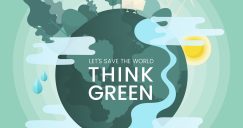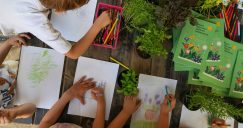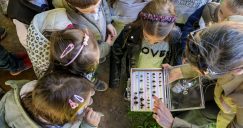Settings for regenerative learning
Lifelong Learning

- Article, Educational resource, Research
“the life situations that call for lifelong learning are undergoing transformation, and the vision of lifelong learning must therefore be transformed as well, that is, extended, broadened and deepened”
Paul Bélanger: Self-construction and Social Transformation: Lifelong, Lifewide and Life-deep Learning (2015)
Beyond providing skills, knowledge and competences for climate action, lifelong learning empowers learners of all ages and contributes to societal transformation. Adult education is crucial not only to support individual learners but also key for social cohesion and to build resilience among communities (EAEA, 2020). Learning Ventures will bring together members of the community united around a common goal of improving education and lifelong learning in their localities.
Key Concepts
The concept of lifelong learning, describing learning “from cradle to grave”, gained popularity in the EU in the early 2000s, when European Commission issued the Memorandum on Lifelong Learning. The document put lifelong learning in a holistic perspective, focusing on building knowledge-based societies and fostering active citizenship.
Within the continuum of lifelong learning, adult learning and education refers to a range of formal, non-formal and informal learning activities that are taken up by adults after they have left their initial education and training. Its understanding differs across Europe and consequently in the countries represented by the LEVERS consortium: in Serbia adult learning might be mostly defined as vocational education and training, while in Ireland it might predominantly refer to community education.
In this context, it might seem difficult to find a shared understanding of the key concepts that underpin lifelong learning and adult learning. That said, there have been several initiatives recently that might be helpful to explore for the partners of LEVERS who are establishing their Learning Ventures.
In recent years, the concept of life skills has been gaining popularity. EAEA’s project Life Skills for Europe defines life skills as “a constituent part of capabilities for life and work in a particular social, cultural and environmental context. The types of life skills emerge as a response to the needs of the individual in real life situations.” They range from literacy capabilities to digital, health or environmental ones.
The key element of the life skills approach is that they are interlinked: a learner might be following a course that’s explicitly on improving reading or language skills but will also discuss environmental issues. The life skills approach also implies that learning should stay relevant to adults’ personal and professional lives, which is particularly important in a project like LEVERS, that also raises questions that are important in the local community.
Skills for Life are now one of the actions of the European Skills Agenda, adopted by the EU in 2020.
Case Study: Recycling Design
Recycling Design, run by DOF Allerød Fritidsskole in Denmark, brought together migrant and Danish-born women around a shared interest in needlework. While seemingly focusing on handicraft, it also helped participants improve their language and interpersonal skills.
It also gave room for learners to suggest activities themselves: while discussing how Danish government works in one of the classes, learners suggested organizing a visit to the Parliament and prepared the visit themselves.
Another issue linked to the relevance of learning is the question of the learner’s voice. Learner voice is about “empowering learners by providing appropriate ways of listening to their concerns, interests and needs in order to develop educational experiences better suited to those individuals.” (Walker and Logan 2008), as per AONTAS. By focusing on learners’ needs and including them in how a course is planned, delivered and evaluated, learning providers can foster a culture of respect and community, and build learners’ self-confidence.
Different approaches in Europe have been used to foster learner voice, from inviting learners to become learning ambassadors and make their voice heard at the policy level, to more classroom-based practices, for example by encouraging the use of different tools in the classroom to focus on the individual journey of each learner.
Case Study: My Story - My Agenda, Sweden
Eight folk high schools in Sweden have developed a project which brings forward the participants’ own experiences and stories to advance Agenda 2030. In co-creation between participants and educators, the schools explore new methods and tools for telling and owning one’s own story and intend to create new paths to engagement; large and small, individual and joint.
Resource : Toolkits for practitioners
- The Guidelines and recommendations on change-oriented adult education bring together adult learning theory and practice, with a focus on learner voice and participatory method, in an easy-to-read format.
- The results of the Life Skills for Europe project include a set of good practices, tools, a learning framework and an awareness-raising toolkit.
- EAEA podcast Beyond Learning is about stories of learning, and stories of change. We meet with learners, educators and community organisers to ask them why learning should be at the heart of a greener future, and how it has already shaped their lives and communities.
- The Electronic Platform for Adult Learning in Europe produces a series of podcasts that discuss different issues in adult learning and education, from digital skills to democratic engagement.
- Introduction to adult learning in Europe is an online course that gives a broad perspective on how adult learning is understood in Europe.
- Together for change -online course introduces the concept of change-oriented adult education and the role it can play to further democracy and foster inclusion in our society.
- EAEA concept paper on Adult Learning and Green Transition gives an EU and global policy background, looking at green and adult learning agendas within the context of multiple crises. It closes with a set of good practices that encourage learning for the green transition.
- Let’s get our hands dirty! Greening Adult Learning and Education. EAEA background report (2021) contextualises adult learning and education from the broader activist perspective. It includes a green glossary with key definitions and concepts.
- ELM: Lifelong Learning Magazine looks at topical issues in lifelong learning with a journalistic perspective. The latest edition focuses on sustainable future and looks at grassroots lifelong learning initiatives from across Europe.








